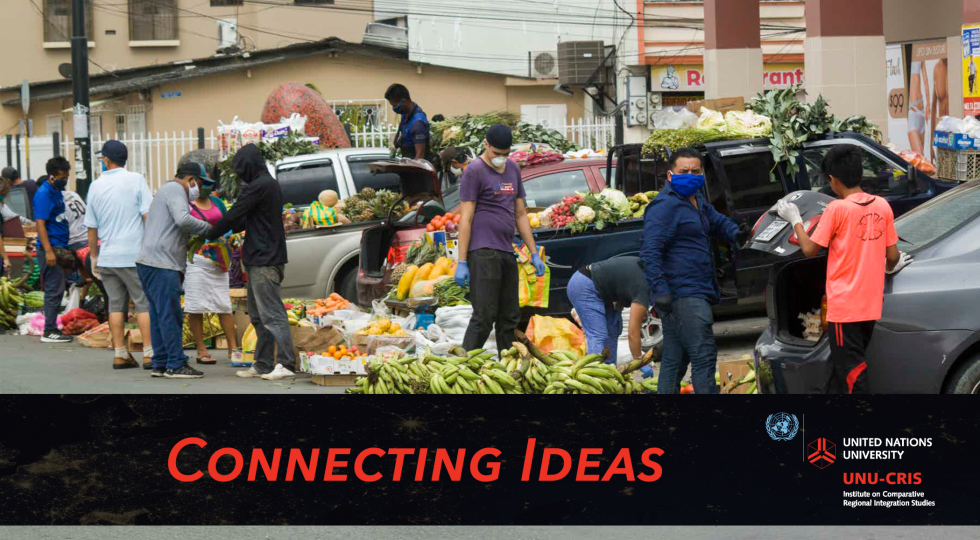Disrupted Latin American Integration: Challenges to Business as a Result of COVID-19


Daniela Acuña
BSc Student in International Business and Relations and Researcher at Semillero NEGOCIOS, Universidad de La Salle Colombia

Nicol Cárdenas
BSc Student in International Business and Relations and Researcher at Semillero NEGOCIOS, Universidad de La Salle Colombia

Irma Vásquez
Professor of International Business and Relations and Research Director of Semillero NEGOCIOS, Universidad de La Salle Colombia
13 May 2020 | #20.20 | The views expressed in this post are those of the author and may not reflect those of the UNU or UNU-CRIS.
In the current interconnected and interdependent economic, political and social system, any change is immediately reflected in other parts of the world, as is the case with the spread of the COVID-19 virus, a situation of high risk for humanity. The life of each individual is at risk, either regarding their health or as a result of the instability of the capitalist economic system that upholds and promotes development. Pandemics are part of history and of economic changes, causing thousands of deaths and financial catastrophes, and this is why countries take contingency measures to protect their citizens.
Each pandemic brings an increase in economic and social inequality, even more so in regions that have traditionally been characterised by high inequality, such as Latin America. Therefore, there is a need to understand the implications of COVID-19 for Latin American integration. We’d like to highlight and examine two in particular, related to the provision of regional public goods: the regulation and promotion of formal and informal employment, and the regulatory framework to boost dynamism in business regionally - both without self-sustaining contingency measures and both concerning the social and individual well-being of workers.
Unemployment and weakening governments in some Latin American countries, and the regional capacity of governments and companies, need to converge to involve the latter in setting up regional measures, to promote formal employment, transform informal employment and reduce restrictions on creating new businesses.
Although it is too early to know the full impact and economic, social and political effects that COVID-19 brings, there will undoubtedly be several upheavals and transformations that take place across society. This has caused economic damage to Latin America and the rest of the world due to the economic behaviour of the European Union and the United States as global powers - in particular, it is due to reduced foreign trade with their main and traditional partners in exports, decreased imports from those countries and interrupted global value chains.

The Effect of COVID-19 on Formal and Informal Employment: A Coming Disruptive Change for the Region?
Latin America is experiencing an economic impact of enormous proportion affecting its foreign trade, particularly exports of goods, exports of services (including tourism), and remittances. Agricultural and agro-industrial exports are experiencing less disruption, as opposed to energy and mineral products, which are suffering due to currency devaluation, the significant decrease in oil prices and the reduction in tax revenues. This decrease in foreign trade also implies an increase in unemployment.
After the implementation of lockdowns, public spending has sought to ease the pressure on companies and deliver economic packages for those who depend primarily on informal employment. In doing so, the governments of the region have tended towards national political responses aimed at providing social and economic aid, but with limited provisions and forecasts for the resurgence of economic development in the second half of the year.
However, for how long can Latin American countries pay for these packages which impact GDP, are fiscally unsustainable, and subject to the country's productivity, which in times of crisis is much lower? The economic contraction for the region in 2020 is expected to be -1.8% and of 620 million inhabitants, the number of poor in the region is forecast to increase from 185 to 220 million people. This leads to an increase in socioeconomic inequality across the region, exacerbated by the inevitable cuts to public goods and services.

Innovation Capacity During a Global Crisis: Opportunities for Latin America
The second related COVID-19 implication on regional public goods relates to the ability of Latin American countries to innovate and rethink their businesses – that is, reorganising business models and new processes. Strategies that seek to reduce formal unemployment and informality and to move towards formality through telework are complex and in some instances unrealistic, as many households do not have access to the necessary technology.
On the one hand, this arises the need for the rapid and difficult adaptation to teleworking, recently regulated in some countries. On the other hand, business digitisation cannot be considered as the only and best way out for companies in times of lockdowns. In other words, it is necessary to set up national policies that reduce the time required to create new businesses and to digitise these procedures, promote new ideas through financial and fiscal mechanisms, and present clear strategies for the possibility of temporary or permanent closure of companies, and how to provide a safety net for their employees affected by this crisis and those to come.
Thus, this is a call for regional cooperation to promote employment and innovation policies in companies to face the COVID-19 crisis. The border shutdowns create disagreements between countries because of migration and xenophobia due to its close relationship with informality and unemployment. Therefore, it is vitally important to set a globalised but regional policy that guarantees integration and convergence, and the need to create a bond of cooperation without affecting the sovereignty of its states.
More on COVID-19 in the Connecting Ideas series:
Hammer or Nudge? International Policy Options for COVID-19
Is Lockdown the Same, Everywhere, For Everyone?
East Asia and Pacific: Countries Must Act Now to Mitigate Economic Shock of COVID-19
COVID-19 (Coronavirus) Drives Sub-Saharan Africa Toward First Recession in 25 Years
COVID-19: An Opportunity for Regional Cooperation in Latin America?
The Irresistible Rise of Health Diplomacy: Why Narratives Matter in the Time of COVID-19
Trade Policy and the Fight Against the Coronavirus
When China Sneezes, Asia Catches a Cold
Yes, Crises Do Happen: A Plea for Feeling More Vulnerable After COVID-19
What Can the Coronavirus Teach Us About Regional Integration in Health?
